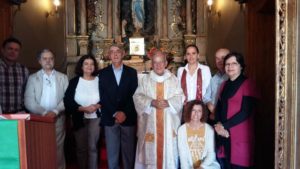– Brought to you by Michael Hartnack
One of the most inspirational and humbling experiences I have recently experienced was yesterday when Yvonne, my wonderful partner and I, took up the invitation of Father Bernardino, given to us at last Sunday’s mass, to join local people from Madeira, as part of the People Helping People project. *
There we shared fine food, fellowship and very simple acts of generosity towards one another. Even where we didn’t understand each other’s language, a nod, a smile and reciprocated acts of kindness saw us through a truly amazing experience of what being a human being is all about.
Despite our differences in culture, language, customs and circumstances, our experience proved to me, that there is far more that joins us together, than could ever divide us. I will remain eternally grateful for the opportunity of having had such an experience.
Father Bernardino simply asked me what I did for a living. I told him that I retired some three years ago as a police Officer in England and now undertake work with victims of crime and their offenders, bringing them both together in a process we call restorative justice. The process of Restorative Justice, allows for harm caused to the victim to be repaired by the offender through a quite simple method but which needs to be skillfully facilitated. For the vast majority of crimes, a civilised society must have the capacity to integrate its wrongdoers back into society, otherwise, like Zacchaeus (from the Bible story), such people would always be on the periphery of society, never accepted, never given the opportunity to make a contribution.
This is not necessarily about forgiveness; it is more about repairing properly the harm that has been caused. It’s called Restorative Justice. It is not about avoiding Justice – many of the offenders I work with are imprisoned for their offending, and rightly so, but the process provides the opportunity for the victim to face their offender and explain the impact that the behaviour of the offender has had on their victim. The criminal behaviour on victims and others is addressed and helps offenders who might never have otherwise had the opportunity, to face a victim and hear first hand the impact of their behaviour.
British courts don’t address this issue and are ordinarily powerless to impose true restorative justice – the repairing of the relationship between two human beings – putting right the real harm that has been caused. Instead, the courts consider all cases to be crimes against the state and have done so for many, indeed far too many years.
Restorative Justice is about facing up to and explaining what one has learnt as a consequence of causing someone harm. Perhaps it goes some way to helping someone on their way to reparation and perhaps even, as I have personally experienced, true forgiveness occurring between two human beings.
Thank you for listening. – Michael Hartnack – 30 October 2016
(Original text edited and shortened for this issue of Joyful Gift). More information on the Restorative Justice program can be found at: www.restorativesolutions.org.uk/
